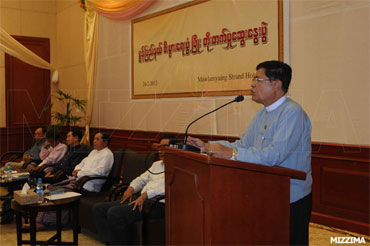Ethnic states in Burma should receive a greater share of revenue for the exploitation of their natural resources, a minister in the President’s Office said on Monday.
 Senior minister Soe Thein said Parliament should approve changes to the Constitution to allow a greater percentage of revenue sharing, in a report on the Radio Free Asia (RFA) website.
Senior minister Soe Thein said Parliament should approve changes to the Constitution to allow a greater percentage of revenue sharing, in a report on the Radio Free Asia (RFA) website.
He said the government of President Thein Sein wanted to provide more autonomy to ethnic states, which have struggled for decades under the former military regimes.
“It is our dream, the president’s and ours, to transfer the power to [the ethnic nationalities] to govern their regions,” he told RFA’s Burmese service.
He said the changes would require amending the current revenue-sharing law to increase the ethnic states’ portion, as stated in the appendix to the Constitution.
A call for greater ethnic autonomy to govern their affairs has long been sought by ethnic groups and has been a major point of contention in government cease-fire negotiations with ethnic armed groups and political parties.
Parliament is now considering a proposal to change the rules in the appendix to the country’s 2008 military-written Constitution to allocate a percentage of revenue from natural resources to each of the country’s states and divisions.
The head of the ethnic Rakhine Nationalities Development Party made the proposal.
Ethnic-based parties must receive attention in managing the country’s affairs, said Soe Thein.
“There are not only two main parties, the USDP and the NLD; we have multiple parties, including ethnic parties and others,” he told RFA. Burma’s natural resources, which include mineral and gas deposits, are concentrated in the country’s predominantly ethnic states, particularly Kachin, Shan, and Karen.
Soe Thein said there are also plans to compensate ethnic states for harm done to the environment because of development projects.
“We also have a plan to provide payment for [harm to] ecological systems for the projects that are in their regions,” he said, noting that countries interested in investing in Burma have similar concerns about managing the environmental and social impact of investments, citing Japan, South Korea, Singapore, and the US and EU-member countries.
Soe Thein said the government would not weaken its environmental protection measures. “The president's investment policy has four points of emphasis and one of them is ‘not to affect the environment,’” he said.
He predicted that the new measures would “definitely” strengthen the investment climate in Burma.
Speaking about his vision for Burma, he said, “In 10 years, I expect that we overtake Cambodia and Laos and at least become like Vietnam. I want to aim like Thailand, but practically that is not possible, as we have much more to do.”


